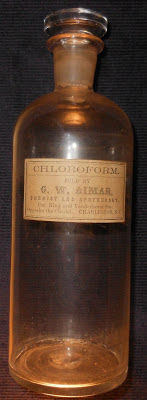 |
| G. W. Aimar & Co. Bottles - Gregory Brownlee Collection |
One of the great joys of writing this blog is hearing from people who I would never have met before and who share wonderful stories about their ancestors, collections, or other interests.
So it was with my recent 3-part series on G. W. Aimar & Co., the longtime (1852-1978) druggist in Charleston, South Carolina: a day or so after the last of the series was posted, I received an e-mail from a reader who has an absolutely amazing G. W. Aimar & Co. collection and he was kind enough to share images for all of us to enjoy! Many - if not most - of the items are rare or one of-a-kind. I am so indebted to Greg for sharing all of this!
And so we have this unforeseen BONUS Part IV to the series thanks to Greg Brownlee, a professional pharmacist and avid collector in Charleston, SC, home to Aimar & Co.
Meet Greg:
I began collecting pharmacy antiques while I was in pharmacy school at the Medical University of South Carolina in Charleston. I have always been interested in the Civil War in particular and "antique" type items or sometimes anything that seemed interesting to me. Being in Charleston will feed any history buffs addiction, no matter what the subject matter.
But I took a history of pharmacy class, and had the pleasure of being introduced to pharmacy antiques from several of my professors who have some magnificent collections. But in that class I was also introduced to some old Charleston pharmacies, Aimar's being one of them. And since it was open for so long and he was a soldier himself during the war, I just took it and ran with it.
Once out of school, I began to collect lots of pharmacy antiques, but as I acquired more and more, I have had to become more selective, picky if you will, about the stuff I collected. But while in school I acquired some Charleston area apothecary/druggist bottles in local antique shops or eBay etc. and started with that. So I concentrate my collection on any Charleston area bottles/items, with a preference toward Aimar items.
I probably have bottles representing 20 or more different pharmacies from the Charleston area, including wartime druggists CH Panknin and his son CF Panknin. Also there may be an AC Phin, who coincidentally GW Aimar apprenticed under before he opened up shop in 1852. Some others during that time - PM Cohen, Dawson & Blackman, Kenifick & Skrin.
Greg - Thank you so much for sharing your wonderful collection with us!
 |
| From Gregory Brownlee Collection: "GW Aimar's original "recipe" book, which has all the original recipes, including the Sarracenia bitters, Queens Delight and much more" |
 | ||
| Aimar Florida Water - Gregory Brownlee Collection |
 | |||||
| Gregory Brownlee Collection |
 |
| Gregory Brownlee Collection |
 |
| Gregory Brownlee Collection |
 |
| Gregory Brownlee Collection |
 |
| Gregory Brownlee Collection |
 |
| Decorative Apothecary Show Globes - Gregory Brownlee Collection |



























